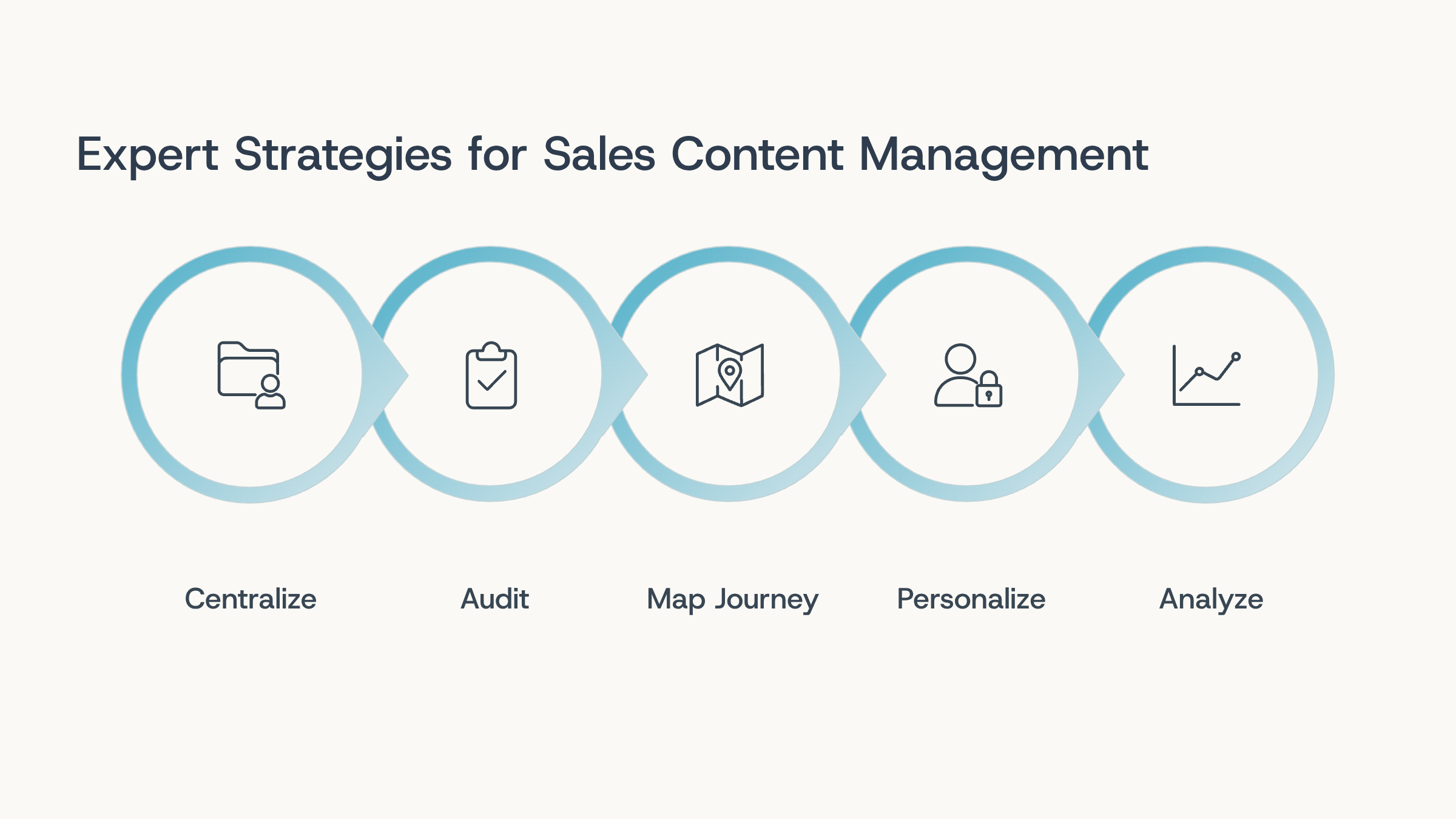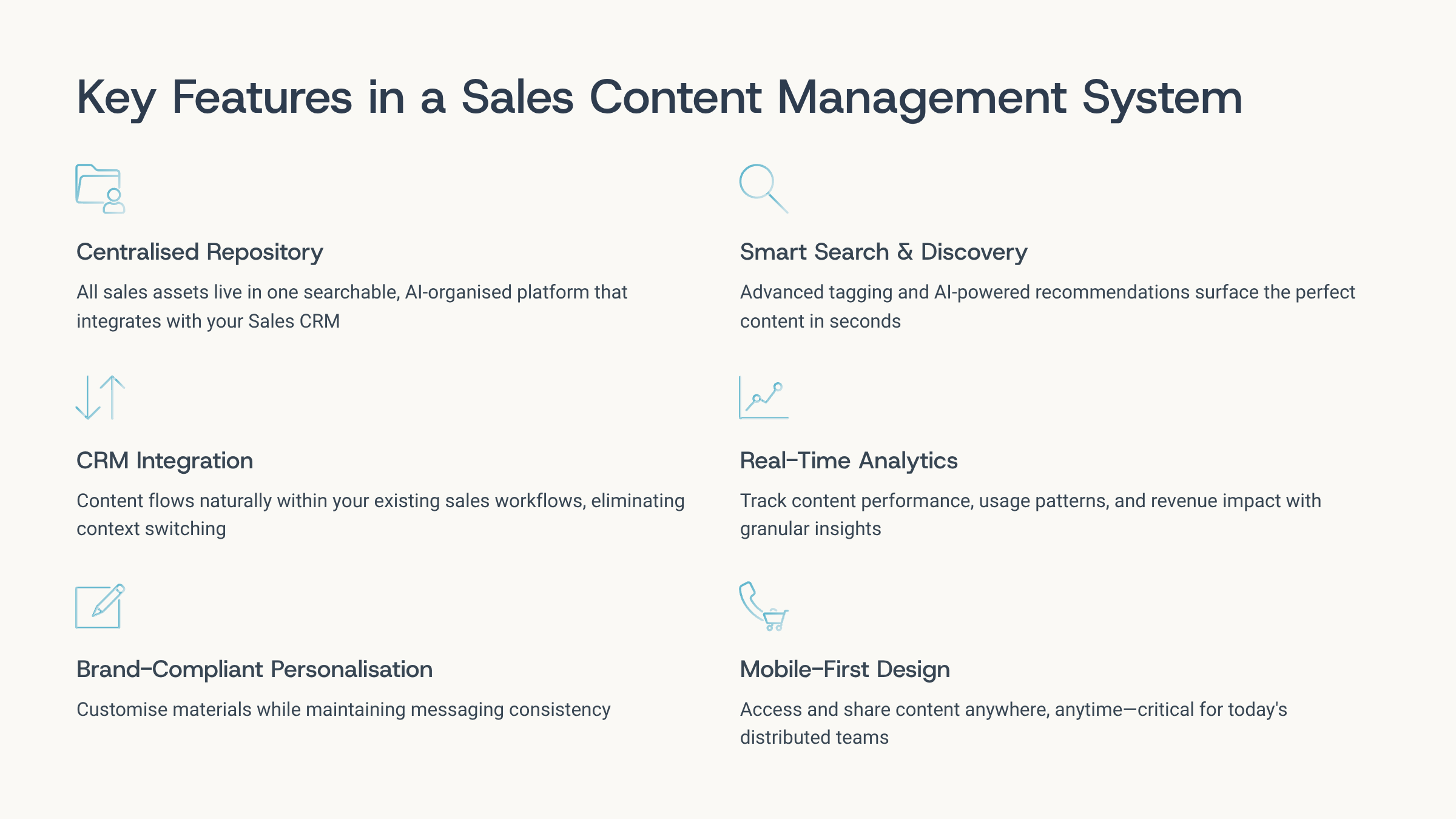What is Sales Content Management? A Definitive Guide 2026
Article written by
Kate Williams

INSIDE THE ARTICLE
SHARE THIS ARTICLE
Summary
If your sales content lives in 15 folders and no one knows what's current, you're losing deals. This blog breaks down how to fix the chaos with proper content management—so reps find what works, use it consistently, and close more. From tech stack setup to curation tactics, it’s your blueprint for better content, faster deals.
Ever wondered why your sales proposals end up in the trash? Delays, outdated information, or missing elements. We've all been there—struggling to find data, lost in files, caught between departments trying to collate everything.
But let's be real, it's 2026. AI is at its peak, yet 65% of sales reps say they struggle to find the right content for prospects, which directly hampers their productivity and effectiveness. Hence, it's high time we get smarter about Sales Content Management (SCM).
In this blog, we'll explore the challenges in sales content management, AI-powered SCM impact, choosing the right platform, and enabling your teams to lock in deals in hours. Let's dive right in.
What is Sales Content Management?
Sales content management is the comprehensive process and system for creating, organizing, storing, distributing, personalizing, and measuring sales materials so your teams can efficiently find, use, and share the right content at precisely the right moment in the buyer journey.
Modern sales enablement content management goes far beyond traditional file storage. It's your revenue engine's control center, where every piece of collateral—from pitch decks and case studies to ROI calculators and product sheets—lives in perfect harmony with your Sales CRM and existing workflows.
SCM tools integrate seamlessly with your tech stack to deliver:
- Centralized Asset Hub: All sales materials in a single, accessible location that eliminates the dreaded "where did I save that presentation?" moment
- Intelligent Categorization: Content tagged by sales stage, buyer persona, and use case, making retrieval lightning-fast and laser-focused
- Dynamic Personalization: Materials tailored for each prospect while maintaining brand consistency across all touchpoints
- Performance Analytics: Robust measurement capabilities that reveal which assets actually move deals forward and drive revenue
Advanced Sales Content Management Software leverages AI-powered automation and integrates seamlessly with leading content management systems, creating intelligent workflows that put the right content in front of the right buyer at the right time—every time.
6 Hidden Cost of Disorganized Sales Content
Still on the fence about SCM? Let's talk numbers—and they might shock you.
Disorganized sales content costs companies millions per year in lost productivity, missed opportunities, and squandered resources. Here's the breakdown:
- Time Hemorrhaging: Sales reps spend up to 30 hours per month searching for or creating their own content instead of selling. With only 39% of a rep's time spent actually engaging prospects, every wasted minute compounds the problem.
- Revenue Leakage: The opportunity cost of underused content can exceed $2.3 million annually at enterprise scale. One study calculated that companies lose $405,000 yearly just from time wasted on scattered data, with potential revenue opportunity reaching $1.2 million.
- Deal Slippage: Disorganization leads to missed follow-ups, delayed responses, and longer sales cycles. When speed matters, every delay is a competitive disadvantage that pushes prospects toward faster competitors.
- Brand Erosion: Scattered, outdated content increases the risk of reps sharing inaccurate information, damaging credibility and customer trust—losses that extend far beyond individual deals.
- Team Burnout: Sales professionals forced to hunt for or create their own materials face higher stress and frustration, leading to decreased performance and increased turnover.
- Perhaps most concerning: Two-thirds of company sales collateral goes unused because reps can't find it or don't trust its relevance. That's millions in marketing investment delivering zero ROI.
8 Expert Strategies for Sales Content Management
Ready to transform your sales content chaos into a competitive advantage? Here's your strategic roadmap:
1. Centralize and Organize Everything
Implement a single, accessible content hub that serves as your team's source of truth. Cloud-based platforms integrated with your CRM ensure materials are available on-demand, whether your team is in the office, at home, or meeting clients.
Pro tip: Structure content by sales stage, product line, and buyer persona with robust tagging for instant retrieval.
2. Audit, Review, and Refresh Regularly
Schedule quarterly content audits to eliminate outdated materials, identify gaps, and prioritize high-impact asset creation. Regular audits can reduce unnecessary content creation costs by up to 20%.
3. Map Content to the Buyer Journey
Align every piece of content to specific sales stages—Awareness, Consideration, Decision, and Post-Purchase. This makes it effortless for reps to select the most relevant materials at any point in the deal cycle.
4. Enable Smart Personalization
Provide customizable templates that let reps tailor content to specific prospects without straying from brand guidelines. Digital sales rooms and built-in personalization features make this seamless.
5. Leverage Analytics and Close the Loop
Track which assets are accessed, shared, and actually influence deals. Analyze engagement metrics and revenue impact to continuously refine your content strategy based on real performance data.
6. Foster Sales-Marketing Alignment
Make content planning a collaborative effort between product marketing and sales teams. Regular syncs ensure what's being created actually addresses what reps need to close deals.
7. Train for Adoption
Provide comprehensive onboarding and ongoing training so reps know how to find and use content effectively. Without proper adoption, even the best SCM system falls flat.
8. Embrace AI and Automation
Use AI-driven recommendations to surface the best content for each selling scenario, reducing rep ramp time and boosting usage rates. Automate version control and content updates to eliminate human error.
Results speak for themselves: Companies implementing these strategies see content usage increase by up to 350%, sales cycles shortened by 20%+, and win rates improve significantly.

Why Sales Content Management Software is Critical for Enterprises
In 2026's buyer-driven market, Sales Content Management isn't just important—it's absolutely critical for survival. Here's why forward-thinking organizations are making SCM a strategic priority:
1. Productivity That Actually Matters
Your sales reps could be saving up to 440 hours per year that they currently waste searching for content. That's nearly three months of additional selling time per rep, per year. When you multiply that across your entire sales organization, the productivity gains become staggering.
2. Consistency Breeds Trust
SCM ensures every customer interaction reflects your latest messaging, pricing, and brand standards. No more outdated presentations or conflicting information that erodes buyer confidence. When your entire team speaks with one voice, prospects notice—and trust follows.
3. Speed Wins Deals
With instant access to relevant, personalized content, your reps can respond to buyer questions immediately, accelerating deal velocity and increasing close rates. In a world where companies that respond quickly are 7x more likely to qualify leads, speed isn't just nice to have—it's everything.
4. Personalization at Scale
Modern buyers expect content that speaks directly to their specific challenges and use cases. SCM enables your team to customize materials for each prospect without compromising brand guidelines or starting from scratch every time.
5. Data-Driven Optimization
Built-in analytics reveal which content assets are actually driving revenue, allowing you to double down on what works and eliminate what doesn't. This closes the feedback loop between marketing investment and sales results.
Key Features to Look for in a Content Management System
A sales content management system serves as the technological backbone of modern sales operations—specialized SCM Software that centralizes creation, storage, organization, and distribution of sales materials, ensuring teams can access the most current, relevant content throughout the entire sales process.
The best sales content management platforms distinguish themselves through these mission-critical capabilities:
Core System Features
- Centralized Content Repository: All sales assets live in one searchable, AI-organized platform that integrates with your Sales CRM
- Smart Search & Discovery: Advanced tagging and AI-powered recommendations surface the perfect content in seconds, not minutes
- Seamless CRM Integration: Content flows naturally within your existing sales workflows, eliminating context switching
- Real-Time Analytics: Track content performance, usage patterns, and revenue impact with granular insights
- Enterprise Security: Role-based access controls and audit trails protect sensitive information while enabling collaboration
- Mobile-First Design: Access and share content anywhere, anytime—critical for today's distributed sales teams
- Brand-Compliant Personalization: Customize materials for specific prospects while maintaining messaging consistency
- Automated Version Control: Ensure only the latest, approved materials reach prospects—no more outdated presentations
Expert Implementation Framework
Week 1-2: Content audit and migration strategy
Week 3-4: Platform configuration and CRM integration
Week 5-6: Team training and adoption workflows
Week 7-8: Analytics setup and optimization protocols
Leading content management systems for sales enablement don't just store files—they create intelligent, data-driven ecosystems that amplify every sales interaction and accelerate deal velocity.

Essential Functions of Sales Content Management Tool
Modern sales management tools like Sparrow Genie serve as the central nervous system for your entire sales operation, streamlining processes and maximizing team productivity through:
- Contact and Lead Management: Organize and track all customer interactions and prospect information efficiently
- Pipeline Visualization: Monitor deal status, identify bottlenecks, and forecast accurately with clear pipeline visibility
- Task Automation: Eliminate repetitive work like follow-ups, lead assignments, and scheduling to free reps for selling
- Performance Analytics: Generate actionable reports on activities, deal progress, and team performance for data-driven decisions
- Team Collaboration: Enable shared calendars, document sharing, and real-time updates for seamless coordination
- Sales Forecasting: Leverage AI and historical data to predict performance and identify opportunities or risks
- Order Management: Streamline processing, inventory updates, and sales detail capture in unified workflows
- Mobile Access: Ensure on-the-go productivity with smartphone and tablet compatibility
- System Integration: Connect seamlessly with CRM, email, marketing automation, and other business tools
- Customizable Workflows: Adapt processes and control access based on roles and specific requirements
These integrated functions reduce administrative burden, improve visibility, ensure consistency, and drive predictable sales outcomes.
Core Benefits of Sales Content Management (SCM) Tools
Sales Content Management platforms deliver transformational benefits that directly impact your bottom line:
- Productivity Revolution: Centralized materials eliminate time wasted searching for or recreating resources, allowing reps to focus on what they do best—selling.
- Message Consistency: Approved, current collateral reduces the risk of outdated or off-brand messaging, strengthening brand integrity and customer trust.
- Accelerated Sales Cycles: Immediate access to tailored, relevant content enables faster responses to buyer needs, shortening deal cycles and increasing win rates.
- Maximized Content ROI: Better categorization and discovery means more marketing-created content actually gets used by sales, maximizing investment returns.
- Actionable Intelligence: Built-in analytics reveal what content drives results, enabling data-driven optimization of collateral strategy and investment.
- Regulatory Compliance: Controlled access ensures only approved, compliant assets reach external audiences, reducing legal and brand risks.
- Streamlined Collaboration: Integrated workflows make it easy for sales, marketing, and enablement teams to collaborate, update, and customize content efficiently.
- Personalization at Scale: Reps can customize presentations for individual prospects while maintaining brand standards, supporting higher engagement rates.
- Faster Onboarding: New hires ramp up quickly using vetted content and structured materials, contributing to revenue sooner.
- Seamless Integration: Platforms connect with existing CRM and communication tools, embedding content into daily sales processes for maximum adoption.
These benefits combine to deliver shorter cycles, higher close rates, reduced administrative overhead, and stronger sales-marketing alignment—measurable improvements in both revenue performance and operational efficiency.
How to Choose the Best Sales Content Management Tool
Selecting the right sales content management tools can make or break your revenue acceleration strategy. Here's a proven evaluation framework used by top-performing organizations to identify the best sales content management platforms for their needs.
The Strategic Selection Process
Phase 1: Requirements Discovery (Week 1)
- Map current content chaos pain points
- Define success metrics with sales and marketing stakeholders
- Identify integration requirements with existing Sales CRM and tools
- Establish budget parameters and ROI expectations
Phase 2: Platform Evaluation (Week 2-3)
Essential Capability | Why It's Revenue-Critical | Evaluation Questions |
Advanced Search & AI | Reps find perfect content in <30 seconds | Does the platform use AI to recommend content based on deal stage and buyer persona? |
Seamless workflow within existing Sales CRM | Can reps access and share content without leaving their CRM interface? | |
Mobile-First Design | Field sales productivity | Is the mobile experience as robust as desktop? Can reps present directly from mobile? |
Real-Time Analytics | Data-driven content optimization | Does it track content performance by deal outcome, not just usage? |
Enterprise Security | Compliance and brand protection | Are there granular permissions and audit trails for sensitive content? |
Personalization Engine | Scaled customization without brand risk | Can reps customize presentations while maintaining approved messaging? |
Expert Evaluation Criteria
- Adoption Velocity: How quickly can your team achieve 80%+ platform utilization?
- Revenue Impact Measurement: Can you directly correlate content usage to deal velocity and win rates?
- Workflow Integration: Does it enhance existing processes or require complete workflow overhauls?
- Future-Proof Architecture: Will the platform scale with your growth and evolving tech stack?
The 30-60-90 Day Success Framework
First 30 Days: Platform deployment, content migration, and initial team training
Days 31-60: Advanced feature adoption, personalization workflows, and analytics setup
Days 61-90: Performance optimization, ROI measurement, and scaling best practices

Leading Platform Categories to Evaluate
- Enterprise-Grade Solutions: Comprehensive Sales Content Management Software with advanced AI and enterprise security
- CRM-Native Tools: Built-in content capabilities within your existing Sales CRM
- Specialized Enablement Platforms: Purpose-built sales enablement content management systems
- Hybrid Solutions: Content management systems with sales-specific modules and integrations
Red Flags to Avoid
- Platforms requiring extensive IT support for basic updates
- Limited or expensive integration capabilities with your Sales CRM
- Weak mobile functionality or offline access
- Analytics that only show usage, not business impact
- Complex user interfaces that slow adoption
Pro Tip: The best platforms feel invisible to your sales team—they enhance existing workflows rather than disrupting them. Focus on solutions that your reps will naturally adopt, not just platforms with the most features.
Final Selection Methodology
- Stakeholder Alignment: Ensure sales, marketing, and IT agree on priorities
- Pilot Testing: Run 30-day pilots with 3-5 top candidates using real content and workflows
- ROI Modeling: Calculate projected efficiency gains and revenue impact for each platform
- Reference Validation: Speak with similar companies about real-world implementation experiences
- Total Cost Analysis: Factor in training, integration, and ongoing management costs
The leading content management systems for sales enablement don't just store content—they become strategic revenue amplifiers that transform how your team engages prospects and closes deals.
Conclusion: Smarter Sales Content Management = More Deals Won
SCM tools has transformed content chaos into competitive weapons for sales teams, becoming a critical ingredient that accelerates revenue systems. While buyers expect personalized, relevant content delivered instantly, your sales team deserves tools that amplify their expertise rather than create friction.
The question isn't whether you can afford to implement sales content management—it's whether you can afford the millions in lost revenue from scattered, underutilized content. Whether you're evaluating comprehensive systems or specialized solutions like SparrowGenie, choose tools that integrate seamlessly with your CRM and deliver measurable ROI. In a world where every interaction matters, teams with the smartest content management systems win the most deals.
Ready to see how AI can transform your RFP process?
Product Marketing Manager at SurveySparrow
A writer by heart, and a marketer by trade with a passion to excel! I strive by the motto "Something New, Everyday"


